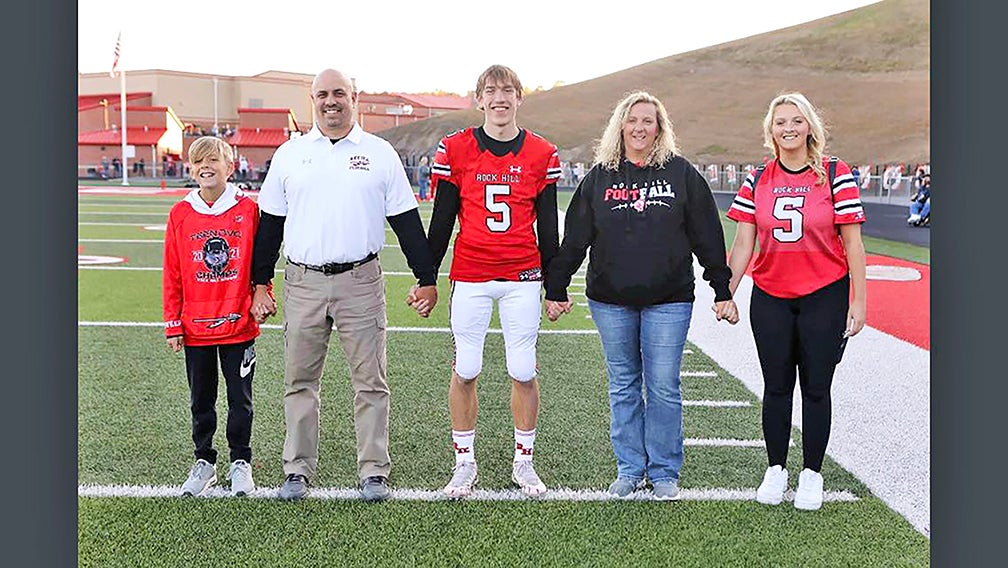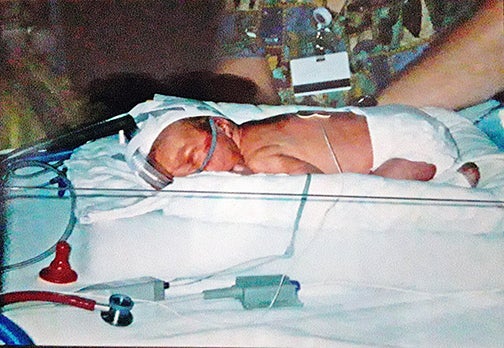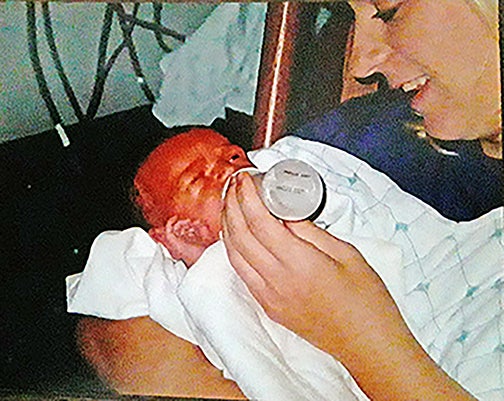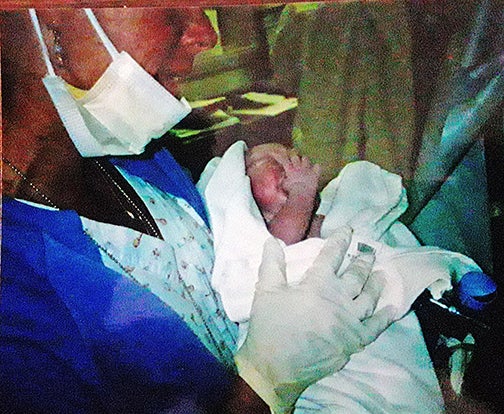‘Air’ Adams: Rock Hill’s Brayden Adams survives RDS to become all-around athlete
Published 10:50 pm Friday, May 19, 2023

Brayden Adams celebrates senior night during football season with his family. From left to right, brother Gage, father Keith, Brayden, mother Julie and sister Keilie. (Tim Gearhart sports photo for The Ironton Tribune)
By Jim Walker
jim.walker@irontontribune.com
PEDRO — Every time after running any distance, Brayden Adams takes a few deep breaths much like anyone else.
But his life didn’t start that way.
In fact, Adams was born with Respiratory Distress Syndrome — known as RDS — which is a common disorder that affects newborns. It occurs in babies born several weeks before their due dates since their lungs didn’t develop enough to make surfactant which is a liquid that coats the inside of the lungs and keeps them open so that the baby can breathe in air once he or she is born.

As a newborn baby, Brayden Adams had to sleep on his stomach and his body was filled with various tubes.
The survival rate has greatly improved in recent years and most newborns with RDS survive. However, these babies may need extra medical care after going home since there can be complications and another lung condition can develop called bronchopulmonary dysplasia.
Adams survived during an era that wasn’t so successful but he didn’t have any other medical problems develop.
“He was born about a week premature,” said mother Julie Adams about going into contractions early. “I was scheduled for a C-section.”
Life is normal for Brayden and what is normal is to be
active. And is he ever active.
Brayden played quarterback and defensive back for the football team but he also played soccer and ran cross country his junior year. He dropped cross country his senior year because of the toll it was taking on his body.
“There’s a reason I’m here. I was given a second chance at life, so I might as well make the most of it and do as much as I can,” said Brayden.
But there’s more.
Brayden has been the starting point guard in basketball the past three season and he also is one of the top sprinters on the track team and was a member of the

Mother Julie Adams gives Brayden is first bottle feeding after he was only fed by tube or needle injections.
4×100-meter relay team that qualified for the state meet last year. He has been a key factor in the Redmen winning the Ohio Valley Conference track championship twice in the past three seasons.
He is currently looking at college options with the University of Rio Grande the frontrunner.
“I’ve still got to talk to the coaches, so we’ll see,” said Brayden.
But neither Brayden or his parents Keith and Julie take anything for granted because they have never forgotten those first six months.
“At that time they didn’t test for surfactant so when he was born he wasn’t producing surfactant in his lungs so he was having trouble breathing,” said father Keith Adams. “His lungs were basically like Saran Wrap when he was born. (The doctors and nurses) knew he was having issues breathing problem but we didn’t. (Julie) was in C-section. He had this funny little cry. What we found out it wasn’t he was crying, he was fighting for air. So, they ended up taking hm down to the NICU unit (neonatal intensive care unit).”
Doctors put Brayden on CPAP which is a respiratory therapy in which air is pumped into the lungs through the nose or nose and mouth during spontaneous breathing.
Brayden’s lungs were found to have tears in them so he ended up with pneumothorax or a collapsed lungs. That condition forced doctors to insert bilateral chest tubes and was given synthetic surfactant. However, Brayden could only be given three doses during those days.
“And after the three there was nothing else,” said Julie.
“If he didn’t start developing his own surfactant at that point he wouldn’t be here,” said Keith. “They were very honest with us. They said after the third does there was a 50-50 chance. I think they give it every other day. He finally started developing his own surfactant on day five. We didn’t even hold him until day five or six.”
Julie had already had a daughter Keilie who was three years older which made this situation even more difficult for her to understand.
“It was hard. We didn’t know what to do,” said Julie. “They called our preacher down and called our family in.”
The synthetic surfactant came from March of Dimes research and they were told if Brayden had been born with this condition five years earlier he would not have survived.
“I can’t imagine what life would have been like without him,” said Keith.
Although Brayden had survived and appeared to be on his way to recovery, there were still some anxious moments.
“There was twice he quit breathing when we brought him home,” said Julie. “There was one time when we were on our way to church and it was me, him nd my daughter in the back seat and Keilie said, ‘Mommy, my baby’s turning purple.’ I pulled off on the highway and got out of my seat belt. At the hospital they said he’ll quit breathing and just to shake him a little and when you shake him it’ll remind him to breathe”
Brayden cried often for about a year and a half and every sickness would put the parents into a panic.
“Every sickness, somebody sneeze in a room he was sick for a week until kindergarten,” said Julie who noted he doesn’t get sick very ofter now.
Brayden had to always sleep on his stomach and Julie covered him with a blanket to block out noise because he would stop breathing when he heard other babies code or cry.
Brayden lost two pounds of birth weight and went home weighing five pounds.
“Once he got through the first six months he was as normal as you can be,” said Keith.
Brayden has no recollection of that time of his life and he said there are no signs or symptoms of what he endured.
“I’ve never had any problems or thoughts about it,” said Brayden. “I just played. I really don’t think about anything. I was definitely lucky.”
Keith said the family doesn’t like to dwell on what happened. He said “We don’t talk a lot about it. Once he was able to get through that initial period, everything was fine.”
Much of the success goes to Dr. Joseph Werthammer and Dr. Gilbert Ratcliff were the doctors who started the NICO Unit at Ceball Huntington Hospital and were hands-on with Brayden.
Even though it doesn’t effect him or he doesn’t think about it, Brayden is very thankful for his survival and he has developed an attitude that he thinks others should adopt.
“Always make the most of your opportunities that you’re given and always give 100 percent in everything you do,” said Brayden. “Never shy away from a challenge. Everything happens for a reason.”
Now that’s something that takes your breath away.


